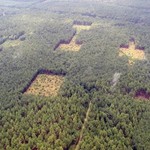
By Anu Passary, March 23, 2015 - As concerns pertaining to environmental change grow by the day, a new study reveals that the world's forest cover is dwindling at an alarming rate and poses a major threat to the global ecosystem.
Per the study conducted by an international team of researchers and written by a North Carolina State University professor, the global forest habitat is steadily shrinking. Researchers note 70 percent of the existing forest cover is within half a mile of the edge of forest areas, making it more susceptible to harm due to agricultural and urban influences.
"It's no secret that the world's forests are shrinking, so this study asked about the effects of this habitat loss and fragmentation on the remaining forests," revealed Dr. Nick Haddad, the author of the study.
For the purpose of the study, the researchers traced the fragmentation of habitats across all the continents via experiments on seven sites on five continents, some of which have been studied for more than 30 years. The team observed varied ecosystems such as grasslands, savannahs and forests.
The researchers discovered that these fragmented habitats are responsible for reducing biodiversity by anywhere between 13 percent to 75 percent. The pivotal functions of an ecosystem are also impaired as the nutrient cycles are altered, with fewer nutrients being retained in a fragmented forest, the biomass reduced, and less carbon dioxide being captured, or sequestered, for long-term storage.
Alarmingly, the maximum impact is on the tiniest and isolated fragments of forest habitats. These negative effects get amplified as time lapses, which is worrying.
"The initial negative effects were unsurprising," Haddad said. "But I was blown away by the fact that these negative effects became even more negative with time. Some results showed a 50 percent or higher decline in plant and animals species over an average of just 20 years, for example. And the trajectory is still spiraling downward."
The team also created a map of the world's forest cover and discovered that there were a handful of habitats that remained free from any form of human development.
"The key results are shocking and sad. Ultimately, habitat fragmentation will also hurt people. This study is a wake-up call to how much we're affecting ecosystems - including areas we think we're conserving," concluded Haddad.
He suggests some of the negative effects of fragmentation can be mitigated by conserving and maintaining larger areas of habitat, making agricultural practices and urban design more efficient, and using landscape corridors, or connected fragments, to help achieve higher biodiversity and better ecosystem function.
The study has been published in Science Advances and was supported by the National Science Foundation (NSF).



